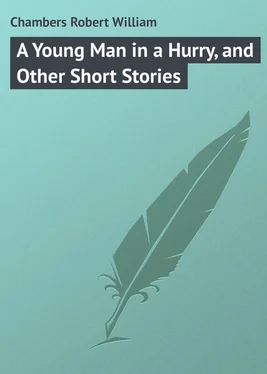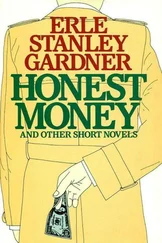Robert Chambers - A Young Man in a Hurry, and Other Short Stories
Здесь есть возможность читать онлайн «Robert Chambers - A Young Man in a Hurry, and Other Short Stories» — ознакомительный отрывок электронной книги совершенно бесплатно, а после прочтения отрывка купить полную версию. В некоторых случаях можно слушать аудио, скачать через торрент в формате fb2 и присутствует краткое содержание. Жанр: foreign_language, foreign_prose, short_story, на английском языке. Описание произведения, (предисловие) а так же отзывы посетителей доступны на портале библиотеки ЛибКат.
- Название:A Young Man in a Hurry, and Other Short Stories
- Автор:
- Жанр:
- Год:неизвестен
- ISBN:нет данных
- Рейтинг книги:3 / 5. Голосов: 1
-
Избранное:Добавить в избранное
- Отзывы:
-
Ваша оценка:
- 60
- 1
- 2
- 3
- 4
- 5
A Young Man in a Hurry, and Other Short Stories: краткое содержание, описание и аннотация
Предлагаем к чтению аннотацию, описание, краткое содержание или предисловие (зависит от того, что написал сам автор книги «A Young Man in a Hurry, and Other Short Stories»). Если вы не нашли необходимую информацию о книге — напишите в комментариях, мы постараемся отыскать её.
A Young Man in a Hurry, and Other Short Stories — читать онлайн ознакомительный отрывок
Ниже представлен текст книги, разбитый по страницам. Система сохранения места последней прочитанной страницы, позволяет с удобством читать онлайн бесплатно книгу «A Young Man in a Hurry, and Other Short Stories», без необходимости каждый раз заново искать на чём Вы остановились. Поставьте закладку, и сможете в любой момент перейти на страницу, на которой закончили чтение.
Интервал:
Закладка:
His wife died; he sent his child to a convent school in Canada and remained to watch. He did the club what damage he could, posting his property, and as much of the river as he controlled. But he could not legally prevent fishermen from wading the stream and fishing; so he filled the waters with sawdust, logs, barbed-wire, brambles, and brush, choking it so that no living creature, except perhaps a mink, could catch a fish in it.
The club protested, and then offered to buy the land on O’Hara’s own terms. O’Hara cursed them and built a dam without a fishway, and sat beside it nights with a loaded shot-gun.
He still had a few dollars left; he wanted millions to crush these rich men who had come here to mock him and take the bread out of his mouth for their summer’s sport.
He had a shrewd young friend in New York, named Amasa Munn. Through this man, O’Hara began to speculate in every wild-cat scheme that squalled aloud for public support; and between Munn and the wild-cats his little fortune spread its wings of gold and soared away, leaving him a wreck on his wrecked land.
But he could still find strength to watch the spite dam with his shot-gun. One day a better scheme came into his unbalanced brain; he broke the dam and sent for Munn. Between them they laid a plan to ruin forever the trout-fishing in the Sagamore; and Munn, taking the last of O’Hara’s money as a bribe, actually secured several barrels full of live pickerel, and shipped them to the nearest station on the Sagamore and Inland Railway.
But here the club watchers caught Munn, and held him and his fish for the game-wardens. The penalty for introducing trout-destroying pickerel into waters inhabited by trout was a heavy fine. Munn was guilty only in intent, but the club keepers swore falsely, and Peyster Sprowl, a lawyer and also the new president of the Sagamore Club, pushed the case; and Munn went to jail, having no money left to purge his sentence.
O’Hara, wild with rage, wrote, threatening Sprowl.
Then Sprowl did a vindictive and therefore foolish thing: he swore out a warrant for O’Hara’s arrest, charging him with blackmail.
The case was tried in Foxville, and O’Hara was acquitted. But a chance word or two during the testimony frightened the club and gave O’Hara the opportunity of his life. He went to New York and scraped up enough money for his purpose, which was to search the titles of the lands controlled by the Sagamore Club.
He worked secretly, grubbing, saving, starving; he ferreted out the original grants covering nine-tenths of Sagamore County; he disinterred the O’Hara patent of 1760; and then he began to understand that his title to the entire Sagamore Club property was worth the services, on spec, of any first-class Centre Street shyster.
The club got wind of this and appointed Peyster Sprowl, in his capacity of lawyer and president of the club, to find out how much of a claim O’Hara really had. The club also placed the emergency fund of one hundred thousand dollars at Sprowl’s command with carte-blanche orders to arrest a suit and satisfy any claim that could not be beaten by money and talent.
Now it took Sprowl a very short time to discover that O’Hara’s claim was probably valid enough to oust the club from three-quarters of its present holdings.
He tried to see O’Hara, but the lumberman refused to be interviewed, and promptly began proceedings. He also made his will; for he was a sick man. Then he became a sicker man, and suspended proceedings and sent for his little daughter.
Before she arrived he called Munn in, gave him a packet of papers, and made him burn them before his eyes.
“They’re the papers in my case,” he said. “I’m dying; I’ve fought too hard. I don’t want my child to fight when I’m dead. And there’s nothing in my claim, anyway.” This was a lie, and Munn suspected it.
When the child, Eileen, arrived, O’Hara was nearly dead, but he gathered sufficient strength to shove a locked steel box towards his daughter and tell her to keep it from Munn, and keep it locked until she found an honest man in the world.
The next morning O’Hara appeared to be much better. His friend Munn came to see him; also came Peyster Sprowl in some alarm, on the matter of the proceedings threatened. But O’Hara turned his back on them both and calmly closed his eyes and ears to their presence.
Munn went out of the room, but laid his large, thin ear against the door. Sprowl worried O’Hara for an hour, but, getting no reply from the man in the bed, withdrew at last with considerable violence.
O’Hara, however, had fooled them both: he had been dead all the while.
The day after the funeral, Sprowl came back to look for O’Hara’s daughter; and as he peeped into the door of the squalid flat he saw a thin, yellow-eyed young man, with a bony face, all furry in promise of future whiskers, rummaging through O’Hara’s effects. This young gentleman was Munn.
In a dark corner of the disordered room sat the child, Eileen, a white, shadowy elf of six, reading in the Book of Common Prayer.
Sprowl entered the room; Munn looked up, then coolly continued to rummage.
Sprowl first addressed himself to the child, in a heavy, patronizing voice:
“It’s too dark to read there in that corner, young one. Take your book out into the hall.”
“I can see better to read in the dark,” said the child, lifting her great, dark-blue eyes.
“Go out into the hall,” said Sprowl, sharply.
The child shrank back, and went, taking her little jacket in one hand, her battered travelling-satchel in the other.
If the two men could have known that the steel box was in that satchel this story might never have been told. But it never entered their heads that the pallid little waif had sense enough to conceal a button to her own profit.
“Munn,” said Sprowl, lighting a cigar, “what is there in this business?”
“I’ll tell you when I’m done,” observed Munn, coolly.
Sprowl sat down on the bed where O’Hara had died, cocked the cigar up in his mouth, and blew smoke, musingly, at the ceiling.
Munn found nothing – not a scrap of paper, not a line. This staggered him, but he did not intend that Sprowl should know it.
“Found what you want?” asked Sprowl, comfortably.
“Yes,” replied Munn.
“Belong to the kid?”
“Yes; I’m her guardian.”
The men measured each other in silence for a minute.
“What will you take to keep quiet?” asked Sprowl. “I’ll give you a thousand dollars.”
“I want five thousand,” said Munn, firmly.
“I’ll double it for the papers,” said Sprowl.
Munn waited. “There’s not a paper left,” he said; “O’Hara made me burn ’em.”
“Twenty thousand for the papers,” said Sprowl, calmly.
“My God, Mr. Sprowl!” growled Munn, white and sweating with anguish. “I’d give them to you for half that if I had them. Can’t you believe me? I saw O’Hara burn them.”
“What were you rummaging for, then?” demanded Sprowl.
“For anything – to get a hold on you,” said Munn, sullenly.
“Blackmail?”
Munn was silent.
“Oh,” said Sprowl, lazily. “I think I’ll be going, then – ”
Munn barred his exit, choking with anger.
“You give me five thousand dollars, or I’ll stir ’em up to look into your titles!” he snarled.
Sprowl regarded him with contempt; then another idea struck him, an idea that turned his fat face first to ashes, then to fire.
A month later Sprowl returned to the Sagamore Club, triumphant, good-humored, and exceedingly contented. But he had, he explained, only succeeded in saving the club at the cost of the entire emergency fund – one hundred thousand dollars – which, after all, was a drop in the bucket to the remaining fourteen members.
Читать дальшеИнтервал:
Закладка:
Похожие книги на «A Young Man in a Hurry, and Other Short Stories»
Представляем Вашему вниманию похожие книги на «A Young Man in a Hurry, and Other Short Stories» списком для выбора. Мы отобрали схожую по названию и смыслу литературу в надежде предоставить читателям больше вариантов отыскать новые, интересные, ещё непрочитанные произведения.
Обсуждение, отзывы о книге «A Young Man in a Hurry, and Other Short Stories» и просто собственные мнения читателей. Оставьте ваши комментарии, напишите, что Вы думаете о произведении, его смысле или главных героях. Укажите что конкретно понравилось, а что нет, и почему Вы так считаете.











